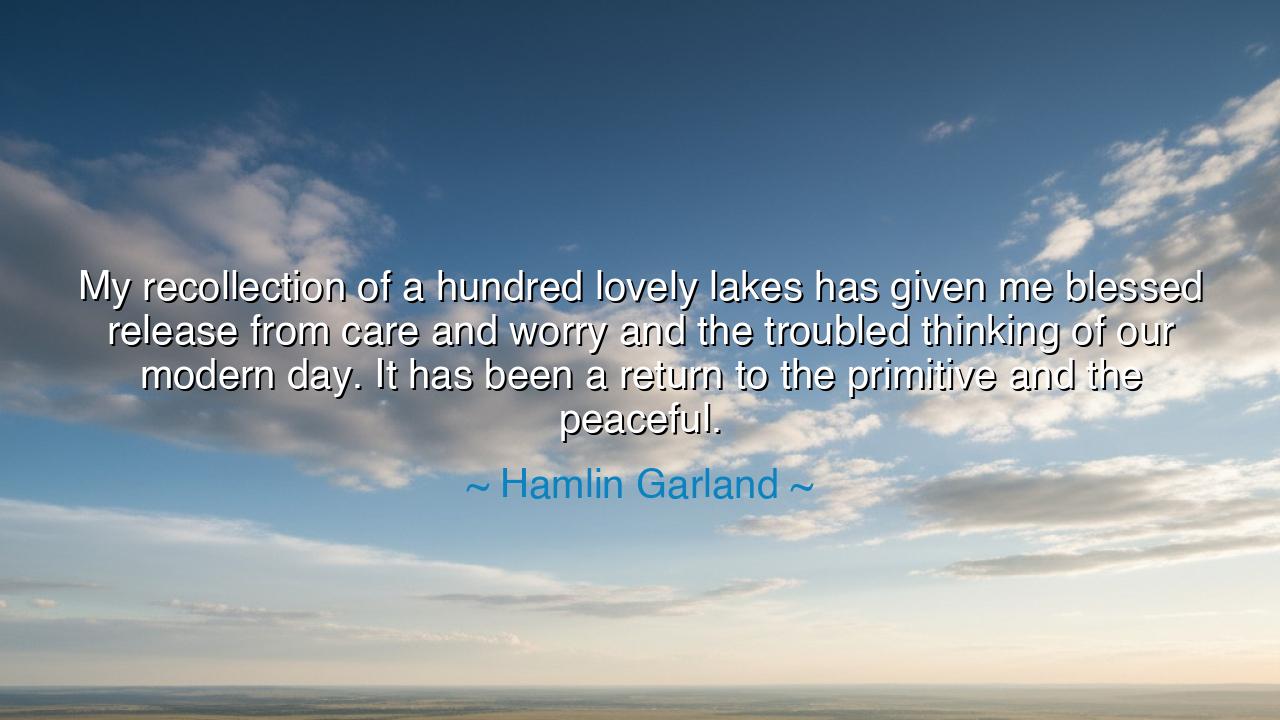
My recollection of a hundred lovely lakes has given me blessed
My recollection of a hundred lovely lakes has given me blessed release from care and worry and the troubled thinking of our modern day. It has been a return to the primitive and the peaceful.






Hamlin Garland, poet of the American plains and chronicler of the frontier soul, once wrote with tender power: “My recollection of a hundred lovely lakes has given me blessed release from care and worry and the troubled thinking of our modern day. It has been a return to the primitive and the peaceful.” In this confession, we hear the timeless voice of one who has felt the crushing weight of civilization’s speed and sought refuge in the eternal serenity of nature. His words are not merely descriptive but restorative, teaching us that the memory of beauty has power to heal the restless mind.
The origin of this quote lies in Garland’s own life, divided between the bustling cities where he sought his livelihood and the wilderness landscapes that had shaped his youth. Born in the Midwest, he carried within him the sights and sounds of the open land — the lakes, the prairies, the endless sky. Yet, like many, he also felt the troubled thinking of the modern world: industry’s noise, the city’s demands, and the pressures of ambition. His remembrance of lakes, then, was not idle nostalgia but an antidote — a mental pilgrimage back to simplicity, a reclaiming of the primitive peace that civilization often obscures.
History is rich with similar lessons. Recall the Roman philosopher Seneca, who lamented the anxieties of Rome’s endless politics and urged men to retreat into the countryside or even into the memory of quiet places. He wrote that a grove of trees, a flowing stream, or the memory of such scenes could calm the soul more deeply than wealth or applause. Garland’s recollection of lakes carries the same spirit — that beauty, once seen, is never lost; it remains as a wellspring of calm to which the heart can always return.
Think also of the story of Leo Tolstoy, who in his later years fled the noise of fame and sought to live among peasants, plowing fields and walking forests. For him, too, this was a “return to the primitive and the peaceful,” a way of shedding the burdens of modern life to rediscover the sacred essence of being. Garland’s words echo this same impulse: the conviction that true freedom is not found in conquest or accumulation, but in harmony with the earth.
The lesson here is profound: peace is not only found in the present, but preserved in recollection. When life overwhelms, the mind may return to the still waters, the quiet dawns, the lakes of memory, and draw strength. Beauty seen once is a treasure forever, a shield against despair. Thus, Garland shows us that we do not need to constantly escape the city to be healed by nature; it is enough to carry its memory in our hearts, to let the stillness of the primitive world live within us even as we move through the complexity of the modern.
What, then, shall we practice? Let us cultivate not only the experience of nature, but the remembrance of it. Let us pause when by rivers or mountains, when near fields or forests, and let those images sink deeply into our souls, so that later, when worry presses, we may recall them as medicine. Let us create our own storehouses of peace, through mindful presence with beauty, so that our hearts may find release when burdened.
Therefore, O children of restlessness, hear Garland’s wisdom: “My recollection of a hundred lovely lakes… has been a return to the primitive and the peaceful.” Seek your lakes, both real and remembered. Walk by them, rest by them, carry them with you. And when the troubles of the world assail you, let memory be your refuge, and the serene face of nature your deliverance. For beauty is not fleeting — it endures within us, a quiet flame against the shadows of care.






AAdministratorAdministrator
Welcome, honored guests. Please leave a comment, we will respond soon